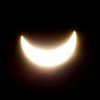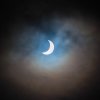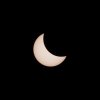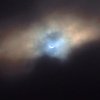wyldeguy said:
Basically what happens is the that the moon in itself acts like a lens, even though it's a solid opaque object.
No, you're thinking of a gravitational lens, the moon is not nearly massive enough to bend the light enough to produce the corona. Instead, it's the solar outer atmosphere that is visible during the totality.
When the solar corona is visible during the totality, it is totally safe to view the sun with the unaided eyes, binoculars, even telescopes without filters... BUT... as soon as even a fraction of the photosphere is visible again, it becomes seriously hazardous for your eyesight to be looking for even a short time into the sun.
The total light from the corona is less than a millionth of the solar output. During a partial eclipse, the Sun is much to bright to directly look at (unless the Sun is very close to the horizon or behind clouds). Solar filters commonly filter out about 10^5 of the light - that is, 16.7 photographic stops. Just for reference.
And about detectors...
sunnyVan said:
My point is that nothing is going to happen to the sensor Unless you point the camera at the Sun for an extended period of time for a long exposure. In this instance long exposure time is not necessary and therefore nothing will happen.
Yes, you are right in that the exposure is important, and that even wide-angle lenses can be dangerous. The intensity on the sensor depends on the f-ratio and not on the focal length, but for the same f-ratio, if you have a longer focal length then the image of the Sun will cover more pixels and thus heat the pixels more quickly. Unless you have the camera mounted on a tripod, the image of the Sun in a wide angle lens is less likely to stay put on the same pixels for a longer duration. And, remember, that if you use live view, you are effectively exposing the sensor for much longer than by just taking a quick exposure.
Just to re-iterate - it is VERY dangerous for your eyesight to look at the Sun through fast optics (unless
very close to the horizon or behind a cloud layer, or properly filtered by
solar filters). Short exposures will not damage your detector - long exposures, or extended use of 'live view', probably will.
Scutchamer said:
The reason sunrises/sunsets don't burn your camera is the same reason it is colder in winter* - and it has nothing to do with distance from the sun/amount of atmosphere between you and it**. It's because you are at an angle to the sun. The same quantity of light from the sun is spread out over a wider area so it's intensity is greatly reduced.
Haha, you're trying to troll us or what?









